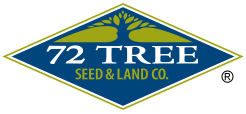Notice: Undefined variable: page in /home/vrxdg1855sn3/public_html/wp-content/themes/72tree/content.php on line 15
Notice: Trying to get property 'ID' of non-object in /home/vrxdg1855sn3/public_html/wp-content/themes/72tree/content.php on line 15
5 Self-Pollinating Fruit Trees for Alpharetta Georgia Landscapes
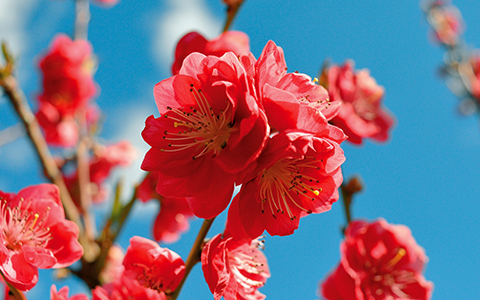
Need help choosing standalone fruit trees for your Alpharetta, Georgia landscape? Knowing which fruit tree species self-pollinate will help you choose individual fruit-bearing trees that provide your Alpharetta, Georgia landscape with shade, beauty, and delicious fruit.
72tree.com gathered species and growing information for several self-fruiting trees hardy to Alpharetta, Georgia, landscapes.
What is a Self-Pollinating Fruit Tree?
Most fruit trees are self-sterile for their own pollen (requiring a second compatible tree and a pollen vector). However, self-pollinating fruit trees only need their pollen to self-fertilize and bear fruit, and they can be planted as a standalone tree. As the name suggests, these trees do not require pollen vectors (bees, flies, wasps, etc.). Consider the following self-pollinating fruit trees for your Alpharetta, Georgia, landscape:
1. Pomegranate (Punica granatum)
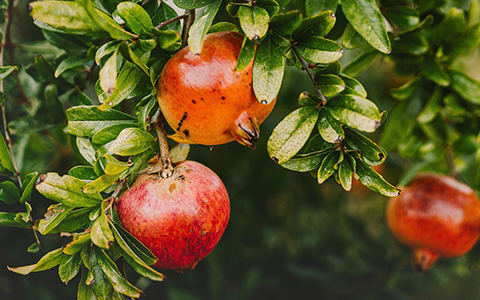
Pomegranates can be grown as large shrubs or small trees with smooth, evergreen leaves, and showy orange to red flowers. It produces rounded and seeded fruit with a dry outer covering.
Mature Size – Pomegranates reach 10 to 20 feet in height and have a 10 to 20-foot spread.
Soil Needs – This species thrives in loam, sandy, and clay well-draining soil with a 5.5 to 7.2 pH.
Sun Requirement – Full sun (minimum 6 hours daily)
Water Needs – Irrigate every 7 to 10 days during dry conditions. Pomegranate trees require approximately 60 inches of water annually.
Fruiting – Pomegranate trees typically produce a harvest two to three years after planting. Most varieties flower from spring into fall and fruits (set in March or April) will be ready for harvest between August and October.
Hardiness Zone – 7 through 10
2. Peach (Prunus persica)
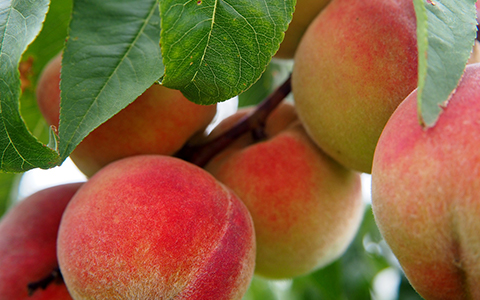
Peach trees typically grow a rounded crown with upward-reaching branches draped in three to six-inch-long, dark green, deciduous leaves.
Mature Size – Peach trees reach 25 feet in height and have a 25-foot spread (when left unpruned).
Soil Needs – This species thrives in lightweight loamy, well-drained soil with a 6.0 to 6.8 pH.
Sun Requirement – Full sun (minimum 6 hours daily)
Water Needs – Irrigate daily with 35 – 40 gallons during summer months. Peach trees require approximately 36 inches of water annually.
Fruiting – Peach trees typically bear fruit 2 to 4 years after planting. A peach tree may bear fruit from June through August, with some species bearing fruit through September.
Hardiness Zone – 4 through 9
3. Apricot (Prunus armeniaca)
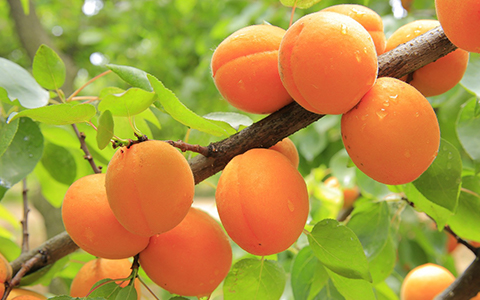
Apricot trees have an upright growth pattern with a broad canopy. The leaves are ovate with a rounded base, pointed tip, and serrated margin. The tree produces white to pink flowers and fleshy yellow to orange fruit. Apricots are self-pollinating, but planting two different varieties (blooming simultaneously) can result in a significantly larger harvest.
Mature Size – Full-size apricot trees reach 25 feet in height and have a 25-foot spread.
Soil Needs – This species thrives in loamy, well-drained soil with a 6.5 to 8.0 pH.
Sun Requirement – Full sun (minimum 6 hours daily)
Water Needs – Provide your apricot tree with an inch of water every ten to 12 days.
Fruiting – Apricot trees typically bear fruit 3 to 4 years after planting. Blooming in early spring only on two-year or older wood. Fruits ripen and should be harvested from June through August.
Hardiness Zone – 4 through 9
4. Fig (Ficus carica)
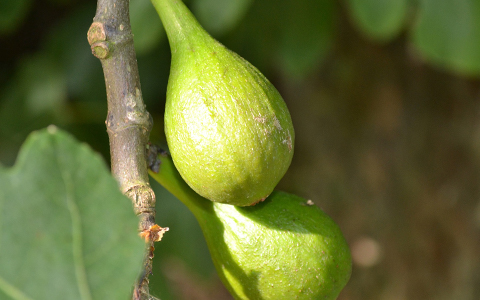
The common fig tree is a deciduous, multi-trunk tree with smooth, gray bark and a wide but low, open canopy. This species has large multi-lobed, showy, dark green leaves and produces small, inconspicuous flowers.
Mature Size – Fig trees reach 10 to 30 feet in height with a 20-foot spread.
Soil Needs – Figs prefer moist, well-drained, organically rich soil with a 6.0 to 7.5 pH.
Sun Requirement – Full sun (minimum 6 hours daily)
Water Needs – Fig trees need 1 to 1-1/2 inches of irrigated water or rainfall per week (minimum).
Fruiting – Most fig trees take three to five years before ripening fruit. Figs typically form on new stem growth each year and ripen from May through November.
Hardiness Zone – 8 through 10 (6 and 7 if protected)
5. Persimmon (Diospyros virginiana)
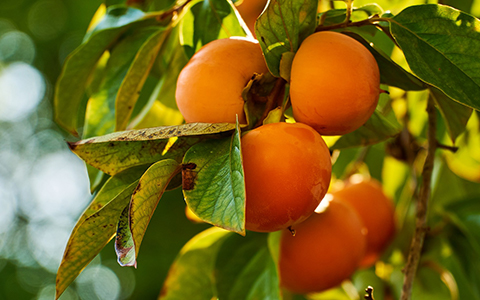
The common persimmon is a deciduous tree grown for its beautiful foliage and delicious fruit. When the fruit ripens, they range in color from yellow to red-orange.
Mature Size – Persimmon trees reach 35 to 60 feet in height with a 20 to 30-foot spread.
Soil Needs – Persimmon trees grow best in loamy, well-drained soil with a 6.0 to 6.5 pH.
Sun Requirement – Full sun (minimum 8 hours daily)
Water Needs – Water a persimmon tree for 10 minutes once or twice weekly in the spring and summer. Persimmon trees can withstand short drought periods.
Fruiting – Persimmons are a fall crop typically ripening from early fall through early winter. There are two primary varieties of persimmons (The astringent fruit is consumed when it becomes soft, and the non-astringent fruit is eaten while firm.
Hardiness Zone – 4 through 9
Self-Pollinating Fruit Trees
In this article, you discovered species and planting information for several self-pollinating fruit trees ideal for landscapes in Alpharetta, Georgia.
Knowing which self-pollinating trees to plant in your Alpharetta, Georgia landscape will help you grow magnificent shade trees that provide an abundant annual fruit harvest.
Avoid planting trees that require attention, pollination, or not knowing which self-pollinating species are most suitable for your Alpharetta yard.
Sources:
extension.uga.edu/publications/detail.html?number=C997
sites.redlands.edu/trees/species-accounts/peach/
plants.ces.ncsu.edu/plants/prunus-armeniaca/
hgic.clemson.edu/factsheet/fig/
missouribotanicalgarden.org/PlantFinder/PlantFinderDetails.aspx?taxonid=279917
